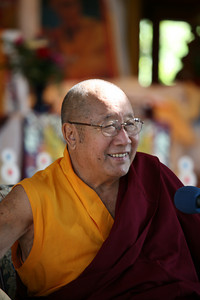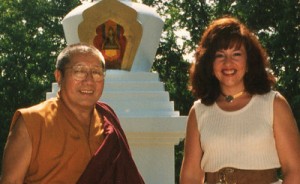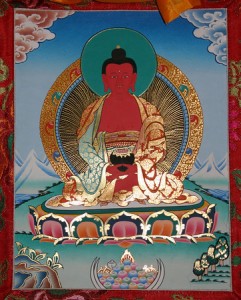From The Spiritual Path: A Compilation of Teachings by Jetsunma Ahkon Lhamo
Every great lama has yearned with sincere intensity for the Precious Teacher. How is it that some people have that yearning and others do not? Some people seem shallow and prideful. Others seem blessed with spontaneous devotion and love. What accounts for the difference? You may not believe it, but the key is discipline. The person who holds to the goal of realizing the Guru’s mind has the discipline to renounce the perceptions of the five senses and to see only with the heart of hope. Not ordinary, dualistic hope, but hope born of trust and faith in the Root Teacher. That takes discipline.
You may think you know the nature of the Root Guru, whose job is somehow to teach you. You may think that the person sitting before you, the one you call “Teacher,” will give you great teachings. Yet you fail to realize that you must cultivate that knowledge with your own effort. You think that somehow, if you try to practice—even though you continually go through your mood swings, your battles in life, and so on—it will all work out in the end. That is a foolish assumption.
This path takes tremendous, relentless, sincere effort. But it’s not just how many prostrations you do or how many hours you put into practice. You must cultivate in yourself a profound yearning. You must think: “If these five senses, pleasantly seductive though they may be, can convince me that I am a separate human being who has a right to hate and who wants to live in such a way that I will be born in terrible places—if these five senses can lie to me so that I am tricked into planting seeds in my own mind for endless future suffering—then I must with all my heart cultivate a yearning to be free of them and to take refuge in the one unfailing source.”
What is that source? Is it a thing? A person? A substance? The one unfailing source is the Root Guru, who embodies freedom from all sensory data and from all beliefs that relate to a separate ego-self. When all considerations of self are gone—when you rely not on the false guru of your five senses, but on the absence of hatred, greed and ignorance—that is the one unfailing hope. It is not within the potential of that nature to hurt you. In the relative world, the world of duality, there is nothing but the potential to hurt you. Everything you touch, see, or feel is impermanent, seductive, and illusory. It contains all the potential for creating the causes of suffering and death. It contains the justification for hate, for saying cruel and unkind things, for being crass, gross, or stupid, for caring only about yourself.
There is only one source of unfailing refuge—the Root Guru, the true face. The Root Guru is the Dharmakaya itself. Why then must we view the flesh and blood teacher as the Root Guru, as the undefiled, unchanging nature? Through the vehicle of that Teacher, you are offered the Dharma, the unfailing method to attain realization of your true nature—the ultimate source of refuge. Thus, the Teacher must be understood as a cornucopia, a feast of all things that will bring about salvation from suffering.
There is another level of understanding. Suppose we say: “I am the same as my Root Teacher. To find that out, I only need to go on a magical journey of discovery.” No matter how we disguise it with beautiful words, the very pridefulness which causes that declaration keeps us from genuinely prostrating. It makes our hearts rigid and stiff. That pridefulness keeps us from bothering to feel deeply, from having true devotion. That pridefulness and ignorance can allow you to come into the presence of your Root Teacher and not even think of Guru Rinpoche, not even think of true nature at all. That very pridefulness is what keeps you believing in self. Actually, you believe in self as well as hope for the truth of its reality. This keeps you clinging to self as a source of refuge, believing that if you could be strong enough, or smart enough, or just discover something wonderful about yourself, it would suffice.
The antidote is to recognize, from the depth of your heart, your own nature as inseparable from the Root Guru and as the true source of refuge. Without that realization, you will always suffer. You will desperately attempt to inflate your ego, thinking that the bigger and more powerful you are, the more easily you can overcome suffering by strength alone. One day, however, you will discover that you have not understood the causes of suffering. Look around you. Look at the most beautiful people in the world. Look at the most lovable people, the strongest and smartest people, even the most virtuous. They will all experience death. There is no hope until you take sincere refuge in True Nature, until you are willing to confront your own five senses, saying: “You have lied to me again and again and again.”
© Jetsunma Ahkön Lhamo


